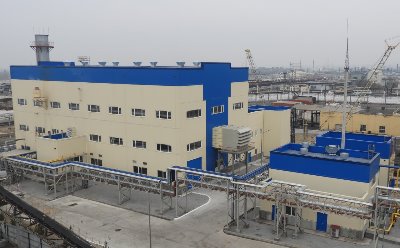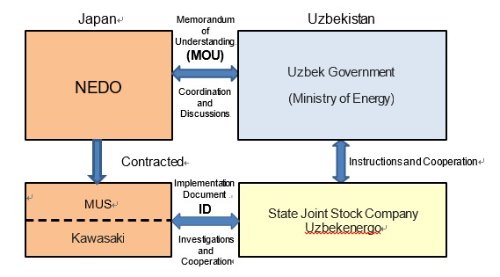Kawasaki and Others Start Demonstration Operations in Uzbekistan for High-efficiency Cogeneration Systems Using Small and Medium-size Gas Turbines
Mar. 02, 2021
Tokyo, March 2, 2021 — Kawasaki Heavy Industries, Ltd. announced today the commencement of demonstration operations for a high-efficiency cogeneration system using a medium-size 17 MW gas turbine, installed at a test site in the Republic of Uzbekistan's Fergana City. The demonstration-use system was installed by Kawasaki, the New Energy and Industrial Technology Development Organization (NEDO) and Marubeni Utility Services, Ltd. (MUS), and commenced operations from January.
Demonstration operations using a cogeneration system with a small 7 MW gas turbine have already been underway since December 2019 at the Fergana RK-3 Heat Supply Plant. Using these two cogeneration systems powered by small and medium-size gas turbines to achieve a distributed power supply enables the supply of power from a nearby location for the local region, which previously relied on power sent from a distant large-scale power plant. This contributes to improved facility energy efficiency and is also expected to reduce transmission loss due to the shorter electric power transmission distance. Through such improvements, the project aims to reduce energy usage by 38% compared with conventional systems and ensure stable supplies of electricity and heat.

1. Project Overview
Stable supplies of electricity and heat are vital to economic development in Uzbekistan. In the Fergana area in particular, a highly concentrated and growing population is creating increased demand for electricity and heat. However, power supplies rely on electricity transmitted from a distant power plant and heat supply plants are aging, resulting in low energy efficiency performance. In response, Fergana is calling for the creation of a highly energy-efficient combined heat and power supply system based on a local production for local consumption approach.
To help solve these issues, NEDO signed a cooperation agreement with the Uzbek government when the then Prime Minister Shinzo Abe visited the nation in October 2015, and in October 2016 NEDO signed a memorandum of understanding (MOU) for a demonstration project*1 aimed at the dissemination of gas turbine cogeneration systems*2 for purposes of achieving stable electricity and heat supplies. At the same time as the signing of the MOU, MUS and Kawasaki, which have been contracted to carry out the demonstration project, signed an implementation document (ID) with State Joint Stock Company Uzbekenergo. The two companies have proceeded with project operations covering everything from design and manufacture of high-efficiency cogeneration systems using small and medium-size gas turbines, to equipment transport, installation guidance, and startup of facility operations, with the aim of demonstrating energy-consumption efficiency improvements.
In recent efforts, the facility design, equipment manufacturing, installation, and test runs were completed for the cogeneration system using a medium-size 17 MW gas turbine at the Fergana Combined Heat and Power Plant, which is the second demonstration site where operations started in January. Demonstration operations for a cogeneration system using a small 7 MW gas turbine have been underway at the Fergana RK-3 Heat Supply Plant since December 2019, and facility modernization (to enable combined heat and power supply) has been carried out at the heat supply plant, along with efforts to create a framework capable of stable electricity and heat provision for the region.
This project will be continued until the end of FY 2020 in order to verify the effectiveness of the high-efficiency gas turbine cogeneration systems. Using these two small and medium-size gas turbines to achieve a distributed power supply enables the supply of power from a nearby location for the local region, which previously relied on power sent from a distant large-scale power plant. This contributes to improved facility energy efficiency and is also expected to reduce transmission loss due to the shorter electric power transmission distance. Through such improvements, the project aims to reduce energy usage by 38% compared with conventional systems and ensure stable supplies of electricity and heat.
2. Demonstration Project Details
(1) Demonstration Sites and Main Facility Equipment
One combined heat and power plant and one heat supply plant in Fergana City, Uzbekistan
Gas turbine cogeneration systems: one 17 MW turbine, one 7 MW turbine
(2) Cooperating Uzbek Organizations
Supervisory body: Ministry of Energy of the Republic of Uzbekistan
Onsite organizations: State Joint Stock Company Uzbekenergo, Fergana Combined Heat and Power Plant
(3) Project Period
January 2017 to March 2021 (planned)
(4) Demonstration Project Organization

Notes:
*1 Demonstration project
Project name: International Demonstration Project Utilizing Japanese Technologies for Energy Consumption Efficiency Improvements / Demonstration Project in the Republic of Uzbekistan for High-efficiency Distributed Cogeneration Systems Using Small and Medium-size Gas Turbines
Project overview: https://www.nedo.go.jp/activities/AT1_00175.html
*2 Gas turbine cogeneration system
A system that uses power-generation gas turbines to supply electric power, and also supplies heat from operational waste heat.
*3 Demonstration operations
NEDO press release (April 20, 2017): https://www.nedo.go.jp/news/press/AA5_100755.html





